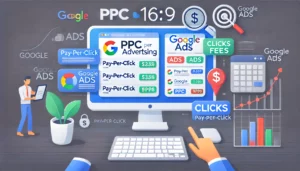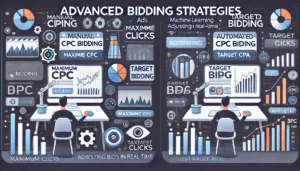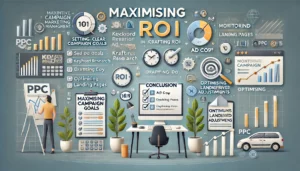What Does a PPC Manager do? PPC Campaign Management: The Ultimate Guide to Maximising Your Brands ROI

What does a PPC manager do?
A PPC manager, or Pay-Per-Click manager, is a digital marketing specialist in charge of running online advertising campaigns that use the pay-per-click model. This means advertisers pay a fee only when someone clicks on their ad.
The PPC manager’s job is to create, manage, and optimise these campaigns to get the most out of the advertising budget. They’ll do this by researching keywords, crafting compelling ad copy, targeting the right audience, and closely analysing campaign data. By analysing results, they can tweak bids, refine targeting, and improve ad copy to ensure the ads reach the most relevant users and generate clicks that convert into sales or leads.
Mastering the art of PPC advertising is paramount for brands seeking to maximise their Return on Investment (ROI).
This ultimate guide delves into the intricacies of PPC, providing insights and strategies to ensure success.
From understanding the basics to implementing advanced bidding strategies, this guide covers it all to help you achieve the best results from your PPC campaigns.
Key Takeaways for “What does a PPC manager do?”
- Understand the fundamentals of PPC advertising and how it benefits businesses.
- Implement effective keyword research strategies to identify high-intent keywords and use the best tools available.
- Craft compelling ad copy that grabs attention, incorporates keywords naturally, and includes persuasive calls-to-action.
- Optimise landing pages for conversions by designing user-friendly layouts, A/B testing, and ensuring mobile responsiveness.
- Analyse and adjust campaign performance based on key metrics and data insights to make data-driven decisions.
What does a PPC manager do?
The Mastermind Behind the Clicks: What Does a PPC Manager Do?
In the ever-evolving world of digital marketing, PPC managers play a crucial role in driving targeted traffic and conversions to websites. But what exactly does a PPC manager do? This role goes beyond simply placing ads online. It’s a strategic blend of data analysis, creative thinking, and campaign optimisation, all aimed at maximising return on investment (ROI) for advertising budgets.
Here’s a deeper dive into the key responsibilities of a PPC manager:
-
Campaign Strategy and Development: PPC managers start by understanding the client’s business goals and target audience. They then develop data-driven strategies that utilise the most effective PPC platforms, such as Google Ads, Bing Ads, and social media advertising channels. This involves in-depth keyword research to identify the terms users are searching for and crafting compelling ad copy that resonates with the target audience.
-
Campaign Management and Optimisation: Once the campaigns are launched, the real work begins. PPC managers meticulously monitor campaign performance through key metrics like clicks, impressions, conversion rates, and cost-per-acquisition (CPA). They analyse this data to identify areas for improvement. This might involve adjusting bids, refining audience targeting, or A/B testing different ad variations to see which ones perform best.
-
Data Analysis and Reporting: PPC managers are data wizards. They translate complex campaign data into actionable insights that inform strategic decisions. They regularly generate reports for stakeholders, highlighting key metrics, trends, and areas of success. This allows them to demonstrate the impact of PPC campaigns on the overall marketing goals.
-
Staying Ahead of the Curve: The world of PPC is constantly evolving. New platforms emerge, and existing platforms introduce new features. PPC managers stay up-to-date with the latest trends and best practices by attending industry conferences, reading industry publications, and participating in online communities. This ensures they can leverage the newest tools and techniques to maximise campaign effectiveness.
-
Collaboration is Key: PPC managers rarely work in isolation. They collaborate closely with other marketing team members, such as web developers and content creators, to ensure landing pages and website content align seamlessly with the PPC campaigns. Additionally, they may work with sales teams to understand their goals and tailor campaigns to generate high-quality leads.
In essence, PPC managers are the orchestra conductors of online advertising campaigns. They combine strategic planning, data analysis, and creative thinking to ensure their clients get the most out of their advertising budgets.
Understanding the Basics of PPC Campaigns & what a PPC manager Does?
What is PPC Advertising?
Pay-Per-Click (PPC) advertising is a digital marketing model where advertisers pay a fee each time their ad is clicked. Essentially, it’s a way of buying visits to your site, rather than attempting to earn those visits organically. Google ads PPC is one of the most popular platforms for this type of advertising, allowing businesses to display ads on Google’s search engine results pages (SERPs) and across its vast network.
How PPC Works
PPC operates on a bidding system where advertisers bid on keywords relevant to their business. When a user searches for those keywords, an auction takes place, and the highest bidder’s ad is displayed. The cost per click (CPC) can vary based on the competition for the keyword. Google Adwords PPC is a prime example of this system, where businesses can set their bids and budgets to control their advertising spend.
Benefits of PPC for Businesses
PPC offers numerous advantages for businesses looking to enhance their online presence:
- Immediate Results: Unlike SEO, which can take months to show results, PPC can drive traffic to your site almost instantly.
- Targeted Advertising: With options for demographic and geographic targeting, you can ensure your ads reach the right audience.
- Measurable ROI: PPC campaigns provide detailed analytics, allowing you to track performance and adjust strategies accordingly.
- Cost Control: You set your budget and bids, giving you full control over your advertising spend.
Partnering with a reputable PPC agency or a specialised London PPC agency can further enhance your campaign’s effectiveness, ensuring you get the best return on investment.
Whether you’re working with Google ads agencies, a PPC ad agency, or a PPC eCommerce agency, understanding the basics of PPC is crucial for maximising your ROI. Regular PPC audits can help identify areas for improvement and ensure your campaigns are always performing at their best.
Effective Keyword Research Strategies
Effective keyword research is crucial for PPC success. Here are some popular tools to help you identify relevant keywords:
- Google Keyword Planner: Provides keyword suggestions and search volume data.
- SEMrush: Offers comprehensive keyword research, competitor analysis, and PPC management features.
- Ahrefs: Known for its powerful backlink analysis and keyword research capabilities.
- Moz Keyword Explorer: Helps find and prioritise the best keywords for your campaigns.
Crafting Compelling Ad Copy
Creating compelling ad copy is crucial for the success of your PPC campaigns. Your ad copy should not only attract clicks but also drive conversions by aligning with the expectations set by the landing page. This coherence ensures a seamless user experience, contributing to higher conversion rates and, ultimately, an enhanced ROI.
Optimising Landing Pages for Conversions
Designing User-Friendly Layouts
Landing pages are the first point of contact between potential customers and your business. To maximise conversions, ensure your landing pages are relevant to your ads, load quickly, and have clear and enticing calls-to-action. Optimisation can lead to higher conversion rates and ultimately improve the ROI of your PPC campaign.
A/B Testing Landing Pages
Testing different elements such as call-to-action buttons, form fields, and page layouts can help identify the most effective strategies to improve conversions. By creating high-converting landing pages, businesses can increase conversions by providing a clear and compelling call-to-action, highlighting the unique value proposition of your business, and addressing the needs and pain points of your target audience.
Ensuring Mobile Responsiveness
In today’s digital age, ensuring your landing pages are mobile-responsive is crucial. A seamless user experience across all devices can significantly boost your conversion rates. Make sure your landing pages are designed to be mobile-friendly, with easy navigation and fast loading times.
Advanced Bidding Strategies to HELP YOU PPC Like a Manager Does?
Manual vs Automated Bidding
When it comes to bidding strategies, you have two primary options: manual and automated bidding. Manual CPC bidding allows you to set the maximum CPC for your ads, giving you precise control over your spending. However, it requires more monitoring and adjustments. On the other hand, automated bidding uses machine learning to adjust your bids in real-time, aiming to maximise results based on your set goals. Automated strategies include options like ‘Maximise Clicks’ and ‘Target CPA,’ which can be particularly useful for achieving specific objectives.
Setting Bid Adjustments
Bid adjustments allow you to increase or decrease your bids based on performance metrics. You can make these adjustments for different categories such as devices, demographics, and even specific audience segments. For instance, you might increase your bid for users who are more likely to convert, a practice known as layering audiences. This enables you to allocate your budget more efficiently, ensuring higher ROI.
Utilising Bid Management Tools
Bid management tools are essential for optimising your PPC campaigns. These tools help you set and adjust bids to ensure you’re getting the best return on investment (ROI). They also offer performance analysis features, allowing you to make data-driven decisions. Some popular bid management tools include Google Ads’ automated strategies and third-party platforms like Marin Software and Kenshoo.
Effective bid management can significantly impact your campaign’s success, making it crucial to choose the right tools and strategies.
Analysing and Adjusting Campaign Performance
Tracking Key Metrics
The importance of monitoring and analysing campaign performance lies in the ability to identify areas of strength and weakness and make adjustments accordingly. This means tracking key metrics such as click-through rate (CTR), conversion rate, cost per click (CPC), and return on ad spend (ROAS). By analysing these metrics, you can identify patterns and trends that can help you make informed decisions about how to optimise your campaign.
Interpreting Data Insights
Regularly review your data, identify trends, and make data-driven decisions to optimise your campaigns. For instance, a high CTR but low conversion rate might indicate that while your ad is appealing, your landing page may need improvement. Using a Google ads audit can help pinpoint specific areas for enhancement.
Making Data-Driven Adjustments
Analyse ad copy performance to see which messages resonate best with your audience. Make data-driven adjustments to improve ad effectiveness. Test different headlines, descriptions, and CTAs to find the most compelling combinations. Additionally, regularly review your keyword performance. Identify high-performing keywords and allocate more budget to them while refining or removing underperforming ones. Use keyword performance data to make informed decisions about bid adjustments and keyword targeting.
Ignoring data analysis can result in missed opportunities. Regularly review your data, identify trends, and make data-driven decisions to optimise your campaigns.
Targeting the Right Audiences is an Important Aspect of What a PPC manager Does!
Demographic Targeting
To maximise your ROI, it’s essential to tailor your audience based on demographics. Google allows you to configure options such as age, gender, and household income. This ensures your ads are reaching the most relevant audience. Targeting the right audience can make a huge difference to your ROI.
Behavioral Targeting
Behavioural targeting involves tracking user behaviour to serve ads to those most likely to convert. Google’s In-Market Audiences feature employs user behaviour tracking to put you in front of prospects who are actively searching for products or services like yours. This method is highly effective for interest-based marketing.
Remarketing Techniques
Remarketing is a powerful tool to re-engage users who have previously visited your site. By using performance data, you can refine your targeting options and adjust demographics, locations, and device targeting to reach the most valuable audience. This step is crucial in ensuring that your ads are being shown to the most relevant audience, maximising your chances of getting clicks and conversions.
Continuously optimise your targeting to ensure your ads are reaching the right people at the right time.
Conclusion on what does a PPC manager do?
In this comprehensive guide, we have explored various strategies to maximise ROI in PPC campaign management. From setting clear campaign goals and conducting thorough keyword research to crafting compelling ad copy and optimising landing pages, each step plays a crucial role in the success of your PPC efforts. By continuously monitoring and analysing your campaign performance, you can make data-driven adjustments to enhance your results. Remember, the key to successful PPC management lies in constant optimisation and staying updated with the latest trends and best practices. Implement these strategies, and you’ll be well on your way to achieving exceptional ROI from your PPC campaigns.
6 Top Frequently Asked Questions for What Do PPC Managers Do?
What is a PPC manager?
A PPC manager, or Pay-Per-Click manager, is a digital marketing specialist in charge of running online advertising campaigns that use the pay-per-click model. This means advertisers pay a fee only when someone clicks on their ad. The PPC manager’s job is to create, manage, and optimise these campaigns to get the most out of the advertising budget.
How does PPC advertising work?
PPC advertising works by allowing businesses to place ads on search engines and other platforms. Advertisers bid on keywords relevant to their products or services, and when a user searches for those keywords, the ads appear. The advertiser pays a fee each time a user clicks on their ad.
What are the benefits of PPC for businesses?
PPC offers several benefits for businesses, including immediate visibility on search engines, targeted advertising, budget control, and measurable results. It allows businesses to reach their target audience quickly and efficiently, driving traffic and potential sales.
What are high-intent keywords?
High-intent keywords are search terms that indicate a user is ready to take a specific action, such as making a purchase or signing up for a service. These keywords are valuable in PPC campaigns because they are more likely to convert into sales or leads.
How can I optimise my PPC campaigns for maximum ROI?
To optimise PPC campaigns for maximum ROI, focus on thorough keyword research, crafting compelling ad copy, optimising landing pages for conversions, using advanced bidding strategies, and continuously analysing and adjusting campaign performance based on data insights.
What is the difference between manual and automated bidding?
Manual bidding allows advertisers to set their bids for keywords, giving them full control over how much they are willing to pay for each click. Automated bidding uses algorithms to adjust bids in real-time based on the likelihood of achieving desired outcomes, such as conversions or clicks.
Author
Search Blog
Free PPC Audit
Subscribe to our Newsletter
The Voices of Our Success: Your Words, Our Pride
Don't just take our word for it. With over 100+ five-star reviews, we let our work-and our satisfied clients-speak for us.
"We have been working with PPC Geeks for around 6 months and have found Mark and the team to be very impressive. Having worked with a few companies in this and similar sectors, I rate PPC Geeks as the strongest I have come across. They have taken time to understand our business, our market and competitors and supported us to devise a strategy to generate business. I value the expertise Mark and his team provide and trust them to make the best recommendations for the long-term."
~ Just Go, Alasdair Anderson






